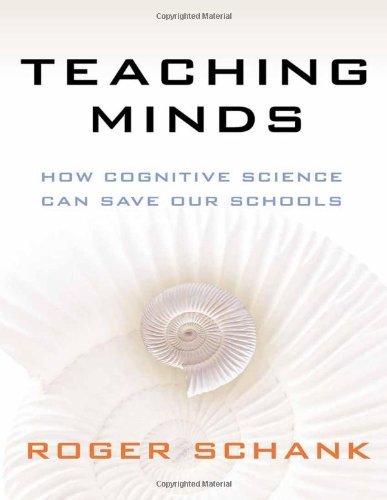Teaching Minds: How Cognitive Science Can Save Our Schools Link to heading
Summary Link to heading
“Teaching Minds: How Cognitive Science Can Save Our Schools” by Roger Schank explores the intersection of cognitive science and education. Schank challenges traditional educational paradigms, focusing instead on how people actually learn. He argues for a radical transformation in teaching methodologies that emphasize the practical application of knowledge and critical thinking skills over rote memorization. The book presents a compelling case for reimagining educational systems to align more closely with cognitive processes, advocating for a learning-by-doing approach which prioritizes real-world problem-solving and experiential education.
Review Link to heading
Roger Schank, a pioneer in artificial intelligence and cognitive science, brings a fresh perspective to education in “Teaching Minds: How Cognitive Science Can Save Our Schools.” His critique of the traditional education system is both sharp and thought-provoking. One of the book’s significant strengths is its practical approach to applying cognitive science principles to improve learning outcomes. However, some readers may find the suggestions too radical or difficult to implement within existing educational frameworks. Despite this, Schank’s work is a valuable contribution to education reform dialogue, providing both educators and policymakers with insightful considerations.
Key Takeaways Link to heading
- Learning-by-Doing: Traditional education should shift towards experiential learning, allowing students to apply knowledge in real-world contexts.
- Critical Thinking: Education systems should foster critical thinking over memorization, helping students to become adept problem solvers.
- Curriculum Reform: Suggests a restructuring of curricula focusing on engaging students through relevant and practical content aligned with cognitive principles.
- Role of Technology: Emphasizes the potential for technological advancements to support new learning models and personalized education.
- Standardized Testing: Critiques the efficacy of standardized testing, arguing it often hinders genuine understanding and cognitive development.
Recommendation Link to heading
“Teaching Minds” is ideally suited for educators, policymakers, and anyone interested in the Future of education. Those looking for innovative, cognitively-informed ideas to reform education systems will find Schank’s insights particularly valuable. The book will also appeal to cognitive science enthusiasts who are interested in its practical application in real-world contexts, especially education.
